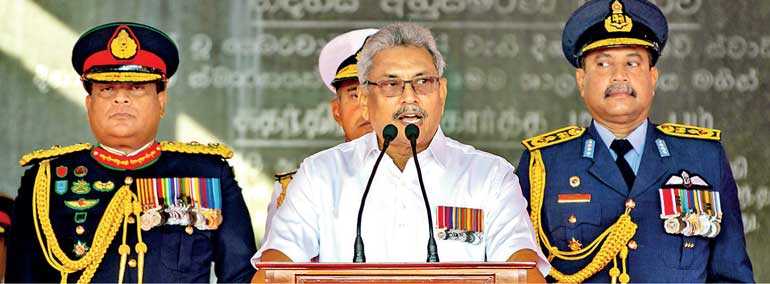Wednesday Feb 18, 2026
Wednesday Feb 18, 2026
Wednesday, 5 February 2020 01:09 - - {{hitsCtrl.values.hits}}

President Gotabaya Rajapaksa addresses the nation at the 72nd Independence Day ceremony.
President Gotabaya Rajapaksa yesterday burnished Sri Lanka’s democratic credentials and pledged to protect the political and economic freedoms of all citizens so that they could live in a truly democratic country.
Addressing the country at the celebrations to mark its 72nd Independence Day, President Rajapaksa emphasised that Sri Lanka was a unitary State and would remain that way during his presidential tenure. He also acknowledged Sri Lanka’s rich democratic past, touching on the importance of maintaining a balance of power between the Executive, Legislature and Judiciary as well as defining powers between the centre and provinces.
As the latest leader of Sri Lanka to have been elected through a universal franchise, Rajapaksa insisted he was dedicated to working for the benefit of all Sri Lankans.
“I address you as the Head of State with a pledge to further strengthen your freedom. I pay tribute to all Sinhala, Tamil, Muslim, Malay, and Burgher leaders who dedicated themselves to achieving and ensuring this independence. Every citizen living in Sri Lanka has the right to live freely and securely. We will always ensure their right to think freely, hold independent opinions, and express themselves without any hindrance,” he said.
“We will always respect the right of any citizen to follow the religion of his or her choice. Every citizen has the right of free association and of free assembly. We will always defend the right of every Sri Lankan citizen to participate in the political and governance processes through his or her elected representatives. We consider all these as the rights of human beings that no one can challenge.”
As the leader of Sri Lanka, Rajapaksa said he understood the responsibility of addressing the concerns of all communities and representing the diversity of the country. He emphasised that the public would only achieve true freedom when social and economic inequalities were minimised. In his view, all citizens within a unitary State should have equal rights.
“In a democracy, when the leader is elected following a legitimate process, he becomes the President of all the people of the country. During his term of office, he must serve all Sri Lankan people. He is not bound to serve only the interests of the people who voted for him. I have the vision that I must serve as the leader of the country looking after all citizens rather than serving as a political leader concerned only about a particular community. As the President today, I represent the entire Sri Lankan nation irrespective of ethnicity, religion, party affiliation, or other differences.
“I am committed to working towards fulfilling the needs of the people of this country. That is my responsibility and my duty. I do not envisage public officials, lawmakers or the Judiciary impeding me in implementing this commitment. I not only respect your freedom, but I will work towards improving it and guarantee the political and economic freedom of a truly democratic country.”
The President pointed out that Sri Lanka had struggled to develop due to nearly 30 years of conflict and various other factors and it could now no longer waste more time. He pledged to accelerate development activities in line with new trends in the global economy by making appropriate use of the country’s unique geographical location and natural and human resources.
However, Rajapaksa reiterated that for Sri Lanka to develop, an efficient and corruption-free public service needed to be established.
“Public administration and governance must function in a proper manner so as to grant people the maximum benefit of their freedom. The entire public administration must accept responsibility for this,” he stated.
“The public will not be free as long as there is corruption at State institutions. Therefore, we will strictly enforce the law to eliminate all social hazards that can impact ordinary social life. The reforms required to increase the efficiency of law enforcement agencies in order to accomplish this are already being carried out.”
President Rajapaksa also said the door was open to criticise the Government and point out its mistakes, revealing that he was open to listening to diverse and opposing views as well as ensuring media freedom. However, he also called on the public to follow their conscience and ensure their actions benefitted the country.
“I wish to fully strengthen the freedom of people to think and write freely. It is then that visionaries and quality works of art will be created. My Government is always ready to tolerate and accommodate opposing views. The media has complete freedom today. We have ensured that everyone has the right to freely express themselves.
“I request everyone to act in accordance with one’s conscience. Always think about the country. Think about your fellow citizens. Without thinking only about political requirements, think carefully about whether your actions and your words will benefit or harm the country. However, if your conscience tells you that the Government is moving in the wrong direction, you always have a duty to boldly point this out.”
President Rajapaksa called on all citizens to respect the rule of law, insisting that genuine freedom was only possible when the law was equally and fairly applied. He also stressed that the Government would work to stop political interference in legal matters.
“We have many challenges ahead of us. We need everyone’s support for the efforts taken by the Government to overcome them. The policy statement I placed before you comprises an action plan that will allow us to overcome the challenges before us. It is our expectation to create a prosperous nation through this. Only the present generation can realise this hope on behalf of future generations. I request all Sri Lankans to join with us in accepting this responsibility that history has bestowed upon us.”
